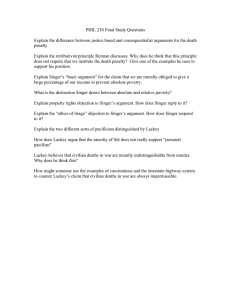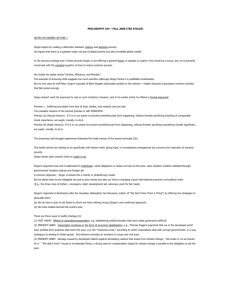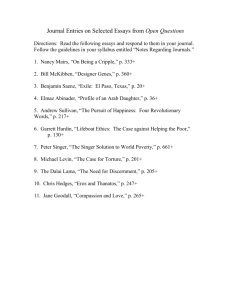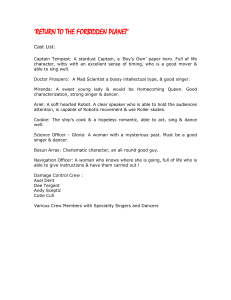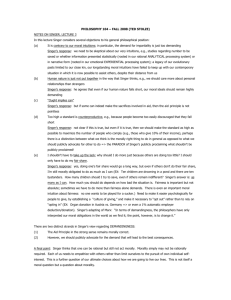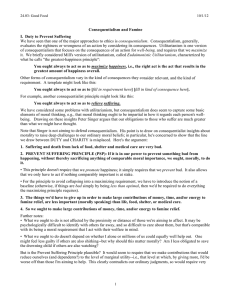24.02 Moral Problems and the Good Life MIT OpenCourseWare .
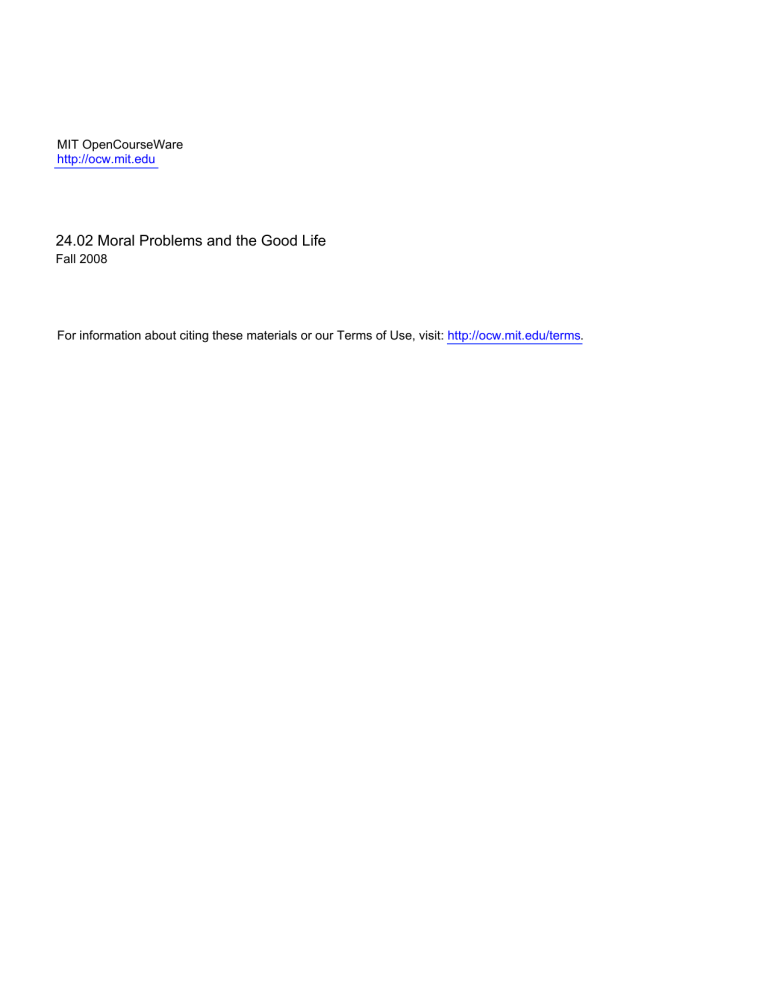
MIT OpenCourseWare http://ocw.mit.edu
24.02 Moral Problems and the Good Life
Fall 2008
For information about citing these materials or our Terms of Use, visit: http://ocw.mit.edu/terms .
Final Exam Study Questions
The final exam for the course will be closed notes and closed books. The exam will have three parts (with their weighted percentage of the grade indicated in parentheses). It will cover material from the whole term. In order to pass the course students must earn a passing grade on the final exam.
I. Identifications
The first part (35%) will consist of identifications: you will be given five quotations and you must provide (i) the author's name, (ii) an explanation of the quote's meaning in your own words, and
(iii) a brief description of the debate to which it contributes, including a statement of (at least) one of the opposing views.
EXAMPLE:
“If it is in our power to prevent something bad from happening, without thereby sacrificing anything of comparable moral importance, we ought, morally, to do it.” i) Singer. ii) This is a statement of Singer’s “Prevent Suffering Principle” which he uses to argue that we ought to contribute large sums of money to famine relief. According to this principle if we can prevent someone having to undergo a bad thing such as dying or suffering greatly, by doing something that does not involve anyone else dying or suffering greatly, we are morally required to do it.
iii) Singer is taking a stand on the question of what we ought to do in response to the great pain and suffering in the world. Although his view is close to utilitarianism, it differs in some ways. A utilitarian would make the general claim that we ought always to do what brings about the greatest happiness or welfare overall. So a utilitarian would hold that if the greatest amount of happiness would be created by allowing some to starve, it would be morally permissible to allow them to starve. On
Singer’s view, however, we should make every effort to prevent something bad from happening, even if it decreases happiness overall, as long as no one would have to suffer to the same extent. Singer’s view has the consequence that some sufferings are so bad that we should give up some degree of welfare or happiness to prevent them.
II. Short Answers
The second part (15%) will consist of short answer questions, e.g.,
1. What is the difference between a desire satisfaction account of the good and an objective list theory?
Describe a case in which the two accounts give different results regarding whether something is good.
Answer: According to the desire satisfaction account of the good, something is good for me just in case it satisfies my desires. Most desire satisfaction theories qualify this simple version because it is typical for people to have desires for harmful things that wouldn’t make their life good. A plausible version of the desire satisfaction theory is one that considers what an ideal version of me would want, so what I would want if I had more knowledge and were able to vividly understand
the consequences of getting what I want. An objective list theory holds that there is a list of things that are objectively good and it is good for me to get the things on this list. On this view it doesn’t matter whether I want the things on the list, what matters is that they contribute to my well-being, objectively understood. For example, according to the objective list theory it might be good for me to be healthy, wealthy and wise, even if I don’t want to be healthy, wealthy and wise.
III. Essays
The third part (50%) will consist of essay questions drawn from the list below. You will be given three of the following five questions, and will asked to write on two of them.
REMEMBER: Be sure to answer the question(s) asked. Although it may be useful to summarize some background material you will be penalized if you fail to address the specific questions posed. Essays will be evaluated both on the degree to which they demonstrate competence with the material covered in class, and a thoughtful engagement with the issues. In preparing for the exam, at the very least make an outline for your answers with a clear thesis and supporting arguments.
1. Peter Singer argues that speciesism, the idea that certain beings deserve to be treated with greater consideration than others, merely in virtue of belonging to a certain species, is just as morally reprehensible as sexism and racism. How solid is this analogy? First: what does Singer think is morally wrong with sexism and racism? Given the material we considered in class, do you agree? What do you think is morally wrong with sexism and racism? Second, does Singer’s account of the moral wrong of sexism and racism plausibly extend to other species? There are significantly greater differences between humans and cows than there are between men and women, or Hispanics and Asians. How does Singer defend his view in light of these differences? Why does he think that these differences are not morally significant and how does his utilitarianism drive these considerations? If you disagree with Singer’s account of sexism and racism, could your analysis be plausibly extended to argue that something is wrong with speciesism? Why or why not?
2. A rich uncle you never knew suddenly dies and in his will he leaves you $100,000 on the condition that you give half of it either to CARE to support famine relief ( http://www.care.org/campaigns/world-hunger ) or to The Wilderness Society for environmental protection (note that Aldo Leopold was one of the founders of the Wilderness Society: http://wilderness.org/about-us/history). The $50,000 cannot be split but must be given to one organization or the other based on what you take to be the more morally worthy cause. Which organization do you choose and why do you think it is the more worthy?
3. In 2007-8 there were a series of incidents on university campuses that were considered cases of racist and homophobic speech: http://www.yaledailynews.com/articles/view/22333 . They included the painting of racist and homophobic slurs and symbols (such as a swastika) on walls and hanging a noose on a Black professor’s office door. Taking into account the material covered in the course, what, if anything, is morally wrong with such actions? If you could write a code of conduct for a private university that was not under the jurisdiction of the federal government (so not subject to the first amendment) would it include anything to prohibit or discourage such incidents? Why or why not?
4. Suppose you think using pornography is immoral. What is the best argument to the conclusion that it should nonetheless not be regulated by the state? Suppose, on the other hand, you think using pornography is perfectly permissible. What is the best argument to the conclusion that it should nonetheless be state regulated (indicate the sort of regulation you would recommend)? Are the resulting positions stable, i.e., is there a tension in either (or both) of the resulting positions that would ultimately make it untenable? What does this suggest about the relationship between moral and legal norms?
5.
Consider this argument by Andrew Sullivan:
“Homosexuality is distinguishable from all of the activities you mention [e.g., incest, polygamy, bestiality] because, exactly like heterosexuality, it exists prior to them. Homosexuality, like heterosexuality, is an unchosen emotional and sexual orientation. Incest, polygamy, and bestiality are subsequent activities, choices, and moral behaviors that are available to heterosexual and homosexual alike. It is perfectly possible therefore--logically, morally, politically, theologically, socially--to include homosexuals within the existing institution and retain a complete and inviolable bar against all these other activities. Indeed, there is no logical connection between any of them and homosexuality at all.” (Andrew Sullivan)
Explain the argument against same-sex marriage that Sullivan is responding to, and evaluate his response in light of the material we’ve covered on same-sex marriage. If one disagrees with Sullivan that homosexuality is not “unchosen” then does his argument fall apart? Is there a better way to draw the line between homosexuality and the other sexual activities mentioned so that legalizing same-sex marriage does not logically require one to tolerate the others?
NOTE: THESE ARE THE FIVE STUDY QUESTIONS FOR 2008. OTHER ESSAY QUESTIONS
POSTED ON THE WEBSITE AS EXAMPLES WILL NOT APPEAR ON THE EXAM.
